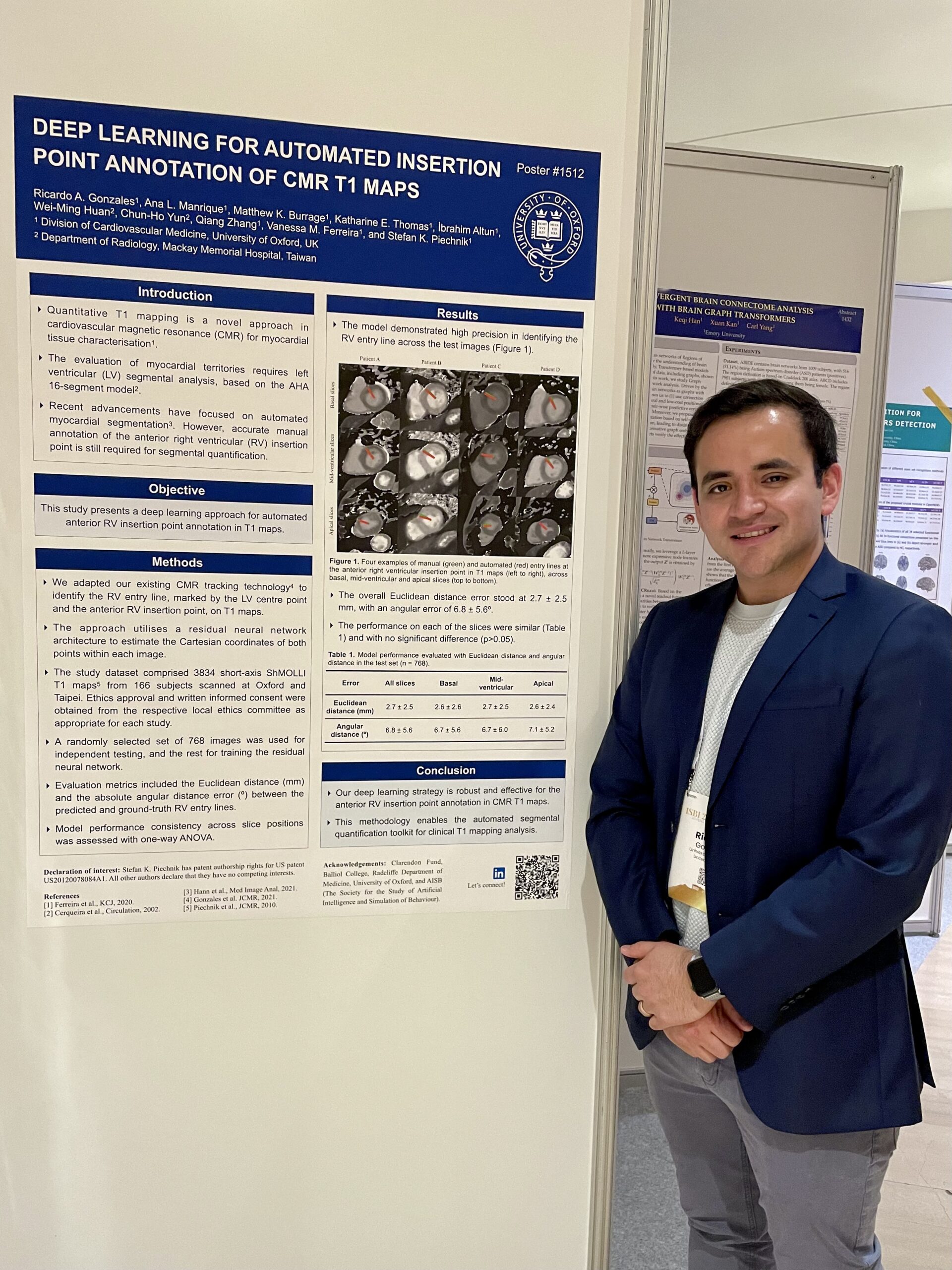Conference Reports: 21st IEEE International Symposium on Biomedical Imaging (ISBI 2024)
Ricardo A. Gonzales (University of Oxford)
I attended the IEEE International Symposium on Biomedical Imaging (ISBI 2024), held from May 27th to May 30th, 2024, in Athens, Greece. This symposium was an excellent opportunity for me to connect with more researchers and present my work, "Deep Learning for Automated Insertion Point Annotation of CMR T1 Maps," which is a result of my collaborative research with my team at the University of Oxford (UK) and Mackay Memorial Hospital (Taiwan). The student grant from The Society for the study of Artificial Intelligence and Simulation of Behaviour and the financial support from Balliol College, Oxford, were instrumental in enabling my participation at this prestigious international platform.
Presented Research
The research I presented enhances the analysis of cardiovascular magnetic resonance T1 mapping by automating the identification of the starting point for standardised myocardial segmentation. T1 mapping is a non-invasive MRI technique that measures the T1 relaxation time of the myocardial tissue, providing valuable insights into its composition and pathology. For accurate anatomical assessment, it is essential to precisely annotate the right ventricular insertion point, which demarcate distinct left ventricular myocardial segments. Our project enhances this process by adapting our existing tracking technology with a residual neural network designed to regress the coordinates of these points. The model, trained on around 4000 images from two different centres, demonstrates high accuracy and is on par with expert-level performance. The implementation of this technology may enhance the accuracy and efficiency of T1 map analysis, facilitating more precise and faster diagnostic processes.
paper (abstract)
Deep learning for automated insertion point annotation of CMR T1 maps
poster
ISBI Conference Overview
ISBI 2024 brought together a global community of researchers, clinicians, and industry professionals dedicated to advancing biomedical imaging technologies. The conference showcased a broad spectrum of cutting-edge research, from novel imaging modalities and machine learning applications to ethical practices in data handling. Participating in this conference enriched my understanding of the field’s current landscape and the innovative technologies shaping the future of medical imaging. It was an invaluable learning experience that expanded my perspective on the potential applications of AI in healthcare.
Highlighted Talks and Inspirational Research
The conference featured several impactful sessions, including a compelling startup pitch during the Industry Day that demonstrated the practical application of recent research in commercial settings. Another highlight was an in-depth tutorial on diffusion models, which are at the forefront of medical imaging technology, offering new methods for image reconstruction, post-processing and analysis. Discussions on foundational models and data privacy also stood out, providing insights into the ethical considerations and the technological advancements that are driving the field forward.
Networking and Social Opportunities
The conference also offered numerous networking opportunities, which were a major factor in my decision to attend. Having presented at ISBI 2022 virtually due to the pandemic, being present in Athens allowed for much more direct engagement with my peers. The social events, such as the Welcome Reception at Zappeion Mansion, the young professional meeting at a roof garden with a view of the Acropolis at night, and a curated tour of the National Archaeological Museum, were not only enjoyable but also provided informal settings to foster professional relationships and discuss collaborative opportunities. The conference organizers and the volunteers made an excellent job at arranging these events.
About the Author
Ricardo A. Gonzales is a PhD candidate in Medical Sciences and Clarendon Scholar at the University of Oxford. Ricardo’s research centres on leveraging artificial intelligence for advanced cardiac imaging, and he is currently working on refining T1 mapping techniques. At the core of his research into deep learning, he is driven by the potential to expedite diagnostic processes, uncover underlying patterns, and enhance accuracy, particularly in medical imaging. Previously, he received his undergraduate degree in Electrical Engineering at UTEC (Peru) and his research training at Yale University (USA) and Lund University (Sweden), where he concentrated on the automated tracking of heart valve movements in cardiac magnetic resonance. Beyond his main research, Ricardo serves as a trainee editor at Radiology: Artificial Intelligence and is an active committee member of Research Experience for Peruvian Undergraduates (REPU), where he contributes to shaping the next generation of STEM professionals from his home country.

